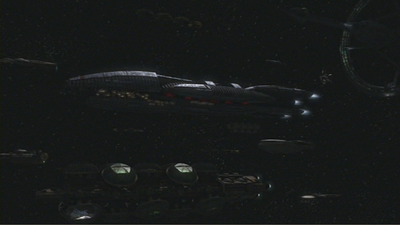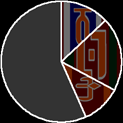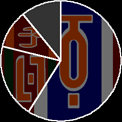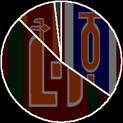This article involves the fleet of faster-than-light-capable civilian ships in the Re-imagined Series. For information on its sublight counterpart in the Original Series, see The Fleet (TOS). For general information on other articles pertaining to fleets, see: Fleet (disambiguation).
|
The Fleet is the convoy of ships sheltering the human survivors of the renewed Cylon attacks against the Colonies. Alternatively, it can also be used to describe the surviving population.
Overview
edit source
- "The Fleet" originates as a convoy of about 60 commercial and civilian ships in the space surrounding Caprica. Laura Roslin, with the aid of Sharon Valerii, initiates the clustering of stranded vessels in the aftermath of the Cylon invasion of the Twelve Colonies, thus forming the convoy. Around twenty of these ships are abandoned to a squadron of attacking Raiders because they either lack FTL drives, or are damaged, like the sub-light Botanical Cruiser and the un-powered Gemenon Liner 1701.
- The remaining vessels join the battlestar Galactica, the only Colonial warship known at the time to have survived the Cylon attack, in the upper atmosphere of the gas giant Ragnar. From this point on, Galactica shoulders the role of the Fleet's protector (TRS: "Miniseries").
- Petty Officer Anastasia Dualla explains that 53 ships jumped away from an attacking Cylon baseship, with 10 still reporting trouble with their FTL drives. Adding Galactica to this tally, the total number of ships is 64 (TRS: "33").
- Colonel Saul Tigh's first statement that the 24 ships departing with the Laura Roslin faction represent "almost a third of the Fleet" implies that the number of ships in the Fleet is approximately in the mid-70's. However, Tigh later responds to the number of civilians joining Roslin by saying, "That's over a third of the people in the Fleet." Since the term "Fleet" is used interchangeably to describe both the ships and the civilian populace, this could imply that Tigh's previous statement was an estimate of the people who left and not the number of ships lost (TRS: "The Farm" and "Home, Part I").
- As an indicator of the crew and passengers aboard the ships, the phrase "the Fleet" also represents all of humanity. Usage of the term "the Fleet" has not gained more than an informal acceptance, as can be seen by President Roslin's continued use of the term President of the Twelve Colonies.[1]
- The Fleet is joined by rebel Cylons, after their numbers are devastated in an ambush by forces loyal to the Number One model. The rebel basestar is later admitted into the Fleet, with a Six named Sonja joining the new Quorum comprised of ship captains (TRS: "Someone to Watch Over Me").
- The ships of the Fleet would eventually be abandoned by the survivors four years after being forced to flee their homes. By this point the Fleet has fallen into disrepair, with Galactica no longer able to protect them. The stresses of combat - especially the Battle of New Caprica - and years spent in space without proper maintenance have taken their toll. Ultimately, the decision is made to abandon Galactica for the basestar, but it takes part in one last operation against loyal Cylon forces.
- The Fleet is directed to their new home, a lush planet suitable for their needs that is unknown to any remaining loyal Cylons. The survivors agree to abandon the Fleet and it is flown into Earth's star, Sol (TRS: "Daybreak, Part II").
Ships
edit sourceSeen
edit source
Mentioned Only
edit sourceUnless otherwise mentioned, the following ships are only listed on the voting tally board in "Lay Down Your Burdens, Part II".[2]
Many of these ships are mentioned or featured again, as the production generated a master list for reference.
Destroyed Before Reaching Earth
edit source
Ships Not Part of Galactica's Fleet
edit source
Population Demographics
edit sourceA few points of information are available concerning the demographics of the Fleet. In "33," before the destruction of the Olympic Carrier, there are 5,251 survivors from Sagittaron and 49,998 total survivors. In "Home, Part I," the Laura Roslin faction leaves the Fleet with 18,000 individuals, of which 9,500 ware Gemenese and 6,250 were Capricans. At that time the total population of the Fleet is 47,857. This information is sparse, but it gives a general idea of the population breakdown of the Fleet if a few assumptions are made for the sake of argument.
- Note that Gemenon and Caprica have more citizens in the Roslin faction alone than Sagittaron has in the entire Fleet. The Twelve Colonies are clearly not represented in equal proportion.
- Before the destruction of Olympic Carrier, Sagittaron natives make up 10.50% of the Fleet. Solely for the purpose of argument, it is assumed that Olympic Carrier's population breakdown was identical to the rest of the Fleet's and that Sagittaron continues to make up 10.50% of the Fleet's total population.
- The figures from the Roslin faction can be interpreted in several ways:
- ASSUMPTION 1: All Gemenese and Capricans jump to Kobol with the Roslin faction.
- Caprica: 6,250 persons (13%)
- Gemenon: 9,500 persons (20%)
- Sagittaron: 5,026 persons (11%)
- Others: 27,081 (57%)
- ASSUMPTION 2: All Gemenese jump to Kobol with the Roslin faction, lured by the "religion card," but the Caprican portion of the Roslin faction is representative of the Fleet.
- Caprica: 28,204 persons (59%)
- Gemenon: 9,500 persons (20%)
- Sagittaron: 5,026 persons (11%)
- Others: 5,127 persons (11%)
- ASSUMPTION 3: Caprican and Gemenese portions of the Roslin faction are representative of the Fleet.
- Caprica: 16,617 persons (35%)
- Gemenon: 25,258 persons (53%)
- Sagittaron: 5,026 persons (11%)
- Others: 956 (2%)
*Although it is plausible that the Caprican population is substantially larger than the other Colonies, as Colonial Heavy 798 is in the vicinity when the attack begins, and is the nucleus around which the Fleet rallies, it is unlikely that the populations of each colony are grossly unequal, or else the Quorum of Twelve would be a very poor system of government. The likeliest scenario is therefore somewhere in between assumptions 1 and 2, with nearly all of the Gemenon population (drawn by the "religion card") and a large portion of the Caprican population leaving with Roslin.
- Alternatively, it is possible that the population of the Colonies are grossly unequal. Although the structure of the Quorum of Twelve appears to maintain at least a fiction that the Colonies are roughly equal, next to nothing is known about how the governmental system of the Colonies was established or how it evolved over time. Indeed, the United States Senate, for example, by design expressly assumes that the various states constituting it are 'equal' even though this is clearly not the case in terms of their respective populations. Furthermore, the fact that a system of government is 'poor' or else not representatively proportional does not mean it cannot actually be implemented and even survive for long periods of time.
- In the Caprica pilot, it is revealed that Caprica and Gemenon are in very close proximity. Since the Fleet formed up around Colonial One, which was in the vicinity of Caprica at the time of the attack, the over-representation of the Caprican and Gemenese portion of the Fleet is now explained.
As for the population distribution, the population of several ships is known: Galactica (2,693 as of "Water"), Olympic Carrier (1,345 as of "33"), Astral Queen (1,500 as of "Bastille Day," retconned up from 500 in the Miniseries) and Pyxis (600 when destroyed in "He That Believeth in Me"). There are 176 civilians in the cargo hold of Colonial One in "Kobol's Last Gleaming, Part II". The Fleet is stated at about 75 ships in "Resistance," retconned up from 40 in the Miniseries.
- Going by the 75 ship count, the remaining ships besides Galactica and Astral Queen each carry about 600 persons on average.
- The 23 ships that leave with the Laura Roslin faction, apart from Astral Queen, would have an average population of about 720 persons per ship.
The Fleet's population has declined by about 8,000 since the above.
Analysis
edit source- By the time of Felix Gaeta's and Tom Zarek's mutiny aboard Galactica (TRS: "Blood on the Scales"), dialogue indicates that the Fleet is down to the very low figure of 35 civilian ships, a surprising loss of about half the initial ships from "33". Most of these losses remain unaccounted for, as very few civilian ships have been seen or heard to be actually lost on screen. Given that the human population has only declined by about one fifth at this point rather than a similar half, this could be a continuity error or retcon, or the remaining ships would have had to nearly double the number of civilians aboard to compensate. It is possible in the context of the dialogue in the episode that the figure of 35 referred only to the number of ships initially loyal to the mutineers.
- The political and social troubles befalling the Fleet as it wanders through space, serve as a metaphor for all of humanity, since the Fleet literally is what is left of humanity in the television series.
See Also
edit source- Gemon Liners
- Pan Galactic
- Sagitarrian Spaceways
- Five-engined vessel
- Wedge-shaped vessel
- Tubed vessel
- Two-engine cargo vessel
- "Kodiak" - The ship itself is unnamed, but clearly identifiable as Kodiak, the command ship of the GDI faction from Command & Conquer: Tiberian Sun.
Notes
edit source- Unofficially, many viewers refer to the Fleet as the "RTF"; "Rag-Tag Fleet," or more fully, "RTFF." These nicknames come from the term "Rag-Tag Fugitive Fleet," a name used in the closing credits voice over of the Original Series (performed by series star Lorne Greene), describing the civilian refugee fleet.
- In the Miniseries, astute viewers may recognize three spacecraft with notable resemblances of ships from other SF universes. The first two of these ships aren't considered a canonical part of the series or the Fleet, but their appearance adds a bit of humor, and pays homage to other notable science fiction and their creative staff.
- Serenity, the central ship from the TV series Firefly and the motion picture Serenity, appears briefly in the sky outside the window of a doctor's office where viewers first see Laura Roslin. The ship does not appear in the Fleet.
- The original USS Enterprise (NCC-1701) from the original Star Trek TV series makes a cameo in the last shot of the Fleet as Elosha chants a prayer in the memorial service near the end of the Miniseries. Look to the upper right corner for the ship in a still frame. All Season 1 opening credits use this shot, so Enterprise makes a very quick appearance with each of the first 13 episodes (This is best viewed from the Season 1 DVD set).
- The ill-fated Botanical Cruiser in the Miniseries was added in homage to the Agro Ship from the Original Series, which in turn were the re-used models from the SF film Silent Running, a Universal/MCA movie that special effects guru John Dykstra worked on a few years prior. At least one FTL-capable version of this ship survives and exists in the Fleet (TRS: "The Passage").
- It is worth noting that inconsistencies of fleet numbers and on-screen visual representing. While dialogue in Season 1 and through to mid-Season 2, indicates between 64 and 75 ships, a count of every background ship until the end of the series will give you at least 101 ships, even accounting for losses in earlier episodes. This discrepancy was never addressed throughout the run of the series.
- A list of blueprints of ships in the Fleet is available.
- These are considered non-canon.
- In a deleted scene from Litmus, the Coronis, as a ship carrying people who are unhappy about being last in food ration distribution, is mentioned. However, it is not present on either the master tally board on Galactica or the whiteboard tracker on Colonial One in "Lay Down Your Burdens, Part II". As Coronis has not been mentioned in any canonical capacity, it is considered totally abandoned by the producers.
- In Greek mythology Coronis is the name of several figures.
References
edit source- ↑ This may be interpreted either as an expression of hope that the people of the Fleet will re-establish themselves on a new world, or a psychological inability to accept the Fleet as the only home that humanity will know for a long time.
- ↑ Note that the tally board in question contains inaccuracies regarding the number of votes, and thus should not be used to determine the population aboard each vessel.
- ↑ The name and the ship are noted in the script for "The Son Also Rises," but not mentioned on screen.
Warning: Default sort key "Fleet (RDM), The" overrides earlier default sort key "Aether".





